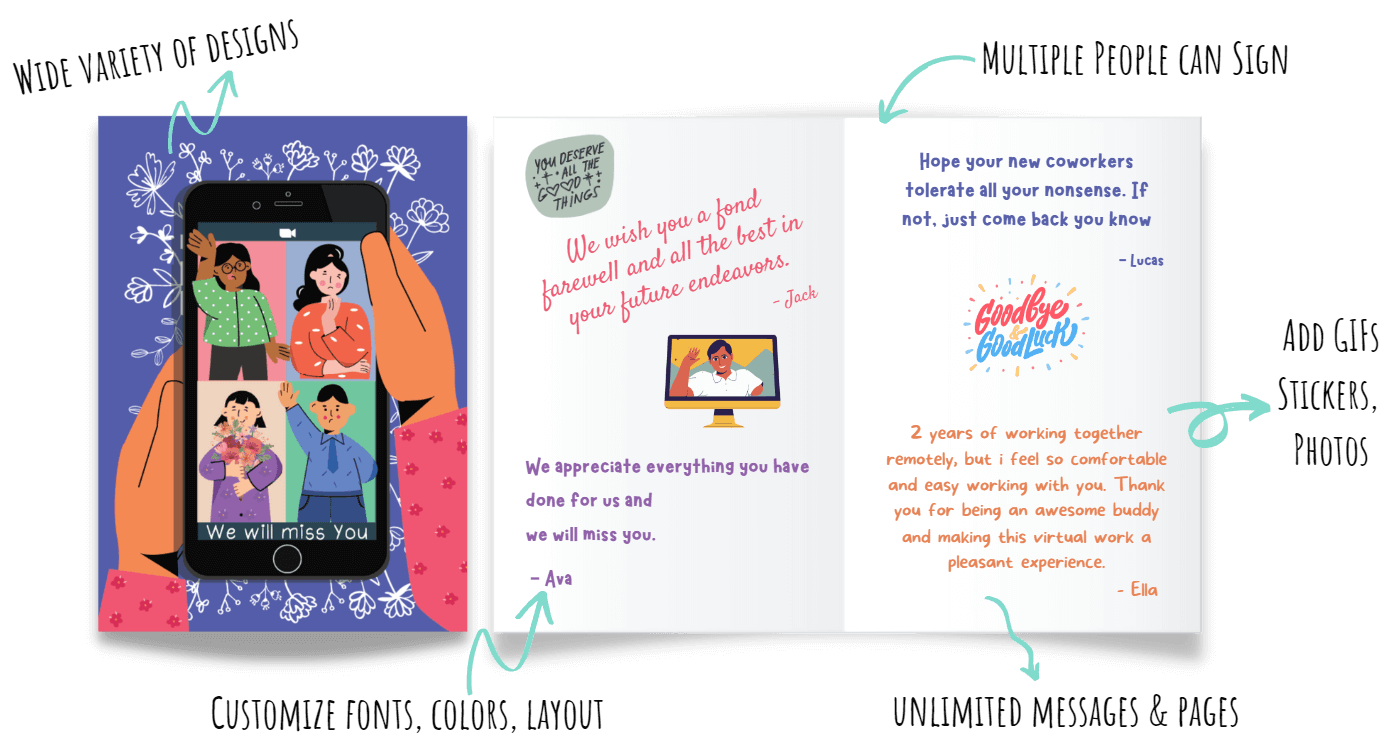Saying goodbye to a colleague, boss, or team member is a common, yet often emotionally charged, part of professional life. A thoughtfully crafted farewell card can serve as a meaningful keepsake, celebrating their contributions and wishing them well on their next adventure. This comprehensive guide will answer your most frequently asked questions about office farewell cards, ensuring your message leaves a lasting, positive impression.
What is an office farewell card?
An office farewell card is a physical or digital greeting card given to a departing colleague, boss, or team member to express gratitude, appreciation, and well wishes as they move on from their role or the company. It serves as a collective gesture of farewell from their current colleagues.
Why are office farewell cards important?
Office farewell cards are important because they:
- Show appreciation: Acknowledge the departing individual’s contributions and hard work.
- Strengthen relationships: Foster goodwill and maintain professional connections.
- Provide closure: Offer a tangible way for colleagues to say goodbye.
- Create a positive memory: Leave the departing person with a heartfelt memento of their time with the team.
- Boost morale: Demonstrate a supportive and appreciative company culture to remaining employees.

What should I write in an office farewell card? (General Tips)
When writing in an office farewell card, aim for a message that is sincere, positive, and appropriate for the workplace. Here are some general tips:
- Express gratitude: Thank them for their contributions, help, or positive impact.
- Mention a specific memory or quality: Personalize your message with a brief anecdote or a positive trait you admire.
- Wish them well: Offer good luck in their future endeavors, new role, or retirement.
- Keep it concise: Aim for 2-3 thoughtful sentences.
- Maintain a positive tone: Focus on the good times and future opportunities.
- Consider your relationship: Tailor the formality based on how well you know the person.
- Proofread: Ensure there are no typos or grammatical errors.
For more detailed answer, check out our article about how to write a farewell card?
How do I write a farewell message for a boss?
When writing a farewell message for a boss, maintain a respectful and appreciative tone. Focus on their leadership and mentorship.
Key elements:
- Acknowledge their guidance and support.
- Mention specific lessons learned or projects they led.
- Express gratitude for opportunities provided.
- Wish them continued success in their next role.
Examples:
- “Thank you for your exceptional leadership and guidance. I’ve learned so much from your vision and mentorship. Wishing you all the very best in your new venture!”
- “It’s been a privilege working under your direction. Your support has been invaluable to my growth here. Wishing you immense success in your next chapter.”
What to write in a farewell card for a close colleague or friend?
For a close colleague or work friend, you can be more personal and informal. Key elements:
- Recall shared memories, inside jokes, or specific team successes.
- Express how much you’ll miss their presence, humor, or specific contributions.
- Reiterate your appreciation for their friendship and support.
- Suggest staying in touch (e.g., “Let’s grab coffee soon!” or “Connect on LinkedIn!”).
Examples:
- “It’s hard to imagine the office without you! I’ll truly miss our [lunch breaks/brainstorming sessions/coffee runs] and your [sense of humor/positive attitude]. Thanks for being such a fantastic colleague and friend. Keep in touch!”
- “Wishing you all the best on your new adventure! It’s been an absolute blast working alongside you, and I’ve learned so much. I’ll miss our [specific activity/joke]. Don’t be a stranger!”
- For specific examples, checkout out article with best farewell messages for colleagues.
How to write a farewell message for a team member (subordinate)?
For a team member, acknowledge their hard work, dedication, and contributions to the team’s success. Key elements:
- Recognize their specific achievements or positive qualities.
- Thank them for their commitment and teamwork.
- Express confidence in their future success.
- Offer well wishes for their next career step.
Examples:
- “Thank you for your incredible dedication and hard work on the team. Your contributions to [specific project/area] were invaluable, and we’ll certainly miss your [skill/attitude]. Wishing you all the very best in your new role – they’re lucky to have you!”
- “It’s been a pleasure having you as part of the team. Your enthusiasm and commitment have truly made a difference. We wish you every success and happiness as you embark on this new journey.”

What if I didn’t work closely with the person leaving?
Even if you didn’t work closely, a polite and professional message is still appropriate. Key elements:
- Acknowledge their departure.
- Offer general well wishes.
- Keep it brief and respectful.
Examples:
- “Wishing you all the best in your future endeavors. Good luck!”
- “Best of luck with your next chapter. It was a pleasure working with you.”
What to write in a farewell card for someone retiring?
Retirement marks a significant life transition. Your message should reflect this milestone with warmth and celebration. Key elements:
- Congratulate them on their well-deserved retirement.
- Acknowledge their years of service, dedication, and contributions.
- Express appreciation for their legacy or impact.
- Wish them joy, relaxation, and fulfillment in their retirement.
- Suggest activities they can now enjoy (e.g., travel, hobbies).
Examples:
- “Congratulations on your well-deserved retirement! Your dedication and contributions over the years have left an incredible mark on this company. Enjoy every moment of this new chapter – it’s time to relax and pursue your passions!”
- “Wishing you a truly wonderful retirement filled with joy, new adventures, and plenty of relaxation. Thank you for your immense wisdom and commitment. You will be greatly missed!”
What if the person was laid off?
This is a sensitive situation. Your message should be empathetic, supportive, and focus on their positive qualities and future potential, without dwelling on the layoff itself. Key elements:
- Express genuine regret or sadness about their departure.
- Highlight their positive attributes, skills, or contributions.
- Offer words of encouragement and confidence in their abilities.
- Avoid mentioning the layoff directly, or expressing anger/frustration about the company.
- If appropriate and sincere, offer to be a resource for networking or references.
Examples:
- “I’m truly sorry to see you go. Your [skill/contribution, e.g., problem-solving abilities] was always so impressive, and you brought such a positive energy to the team. I have no doubt you’ll land on your feet and excel in your next role. Wishing you all the very best.”
- “Your hard work and dedication have made a significant impact during your time here. I wish you nothing but success and fulfillment in whatever comes next. Please don’t hesitate to reach out if I can ever be of assistance.”
Should I include personal anecdotes or inside jokes?
Yes, for close colleagues and friends, personal anecdotes and inside jokes can make the message heartfelt and memorable. They show a genuine connection.
For a boss or someone you don’t know well, it’s generally best to avoid overly personal details or inside jokes that others might not understand. Stick to professional and generally positive sentiments.
Is it appropriate to ask for their contact information?
It is generally appropriate to suggest staying in touch, especially with colleagues you have a good relationship with. You can politely offer to connect on professional platforms like LinkedIn, or share your contact information if you feel comfortable. Directly asking for their personal phone number or email in a group card might be too forward unless you have an existing personal relationship. For more tips on maintaining professional networks, see our guide on Networking Beyond the Office.
What kind of farewell card should we get? (Product Recommendations)
The type of card depends on your team’s culture, budget, and the departing individual’s preferences.
- Traditional Physical Card: A classic choice, widely available at stationery stores (e.g., Hallmark, Papyrus) or online retailers like Amazon. Good for smaller teams or a more personal touch.
- Large Group Card/Poster: For bigger teams, a large card or custom poster offers more space for signatures and messages. Consider online custom printing services like VistaPrint or Zazzle.
- Online Group Card (E-card): Increasingly popular for remote or hybrid teams. Platforms like GreetPool are an excellent option for sending digital group cards with a vast collection of farewell cards for coworkers . These are excellent for:
- Remote teams: Everyone can sign from anywhere.
- Ease of collection: No need to pass a physical card around the office.
- Rich media: Ability to add photos, videos, and GIFs.
- Sustainable: Reduces paper waste.
- Streamlined Process: Platforms like GreetPool simplify coordinating messages from multiple team members, making the process effortless. Learn more about the benefits of digital goodbye cards.

Best practices for a group farewell card:
- Designate a Coordinator: One person should be responsible for purchasing/creating the card, collecting messages, and ensuring it’s presented to the departing individual. With GreetPool, this role is made easy with intuitive management features.
- Communicate Clearly: Inform everyone in advance about the card, where/how to sign, and the deadline.
- Provide Guidance: Offer brief suggestions for what to write, if you have especially for those who might struggle.
- Consider Anonymity (if desired): For digital cards like those offered by GreetPool, some platforms allow contributors to remain anonymous if preferred.
- Present Thoughtfully: Ensure the card is given at an appropriate time, ideally during a farewell gathering or on their last day.
- Combine with a Gift (Optional): A group gift (e.g., gift card, personalized item) often accompanies a farewell card. For ideas, check out our post on Thoughtful Farewell Gift Ideas for Colleagues.
Farewell Card Etiquette: Do’s and Don’ts
Do:
- Be timely: Ensure the card is ready before their last day.
- Be sincere: Write from the heart.
- Keep it positive: Focus on well wishes and positive memories.
- Proofread: Avoid embarrassing errors.
- Sign your name clearly: So the recipient knows who wrote the message.
Don’t:
- Be negative or gossipy: Avoid complaints about the company, other colleagues, or the reason for their departure.
- Make it about you: The card is for the departing person.
- Write excessively long messages: Keep it concise, especially in a group card.
- Include sensitive or inappropriate jokes: What might be funny to you could be offensive to others.
- Pressure others to contribute: Encourage participation, but respect if someone opts out.
By following these guidelines, you can ensure your office farewell card effectively conveys your appreciation and best wishes, leaving a positive and lasting impression on your departing colleague. Whether you choose a traditional card or a modern online solution like GreetPool, the thoughtfulness behind your message is what truly counts.





